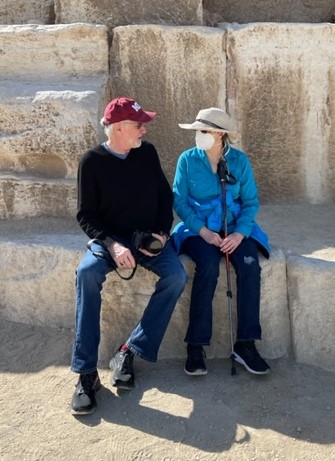Inspirational Stories
Miriam
acute myeloid leukemia (AML)
I was extremely fatigued. I suspected that I had leukemia since I knew a lot about cancer. I saw my primary care doctor and described how bad I felt and my suspicion. He immediately ran blood tests and then referred me to a hematologist oncologist.
I had to wait three weeks to be seen. In the meantime, I got worse. When I was finally seen, I told the doctor what I suspected. He ran more blood tests and then decided that I needed a bone marrow biopsy, which I knew would be the next step. The next day, a Saturday, he called and wanted to come to my house. I couldn't even go downstairs, so he came to me. He told me that I had acute myeloid leukemia (AML) and needed to go to the hospital immediately. I told him that I would only go to Johns Hopkins. He didn't have connections there, so I told him to find a colleague who did. And so, I was admitted to Hopkins. I was told that I had two months to live if I didn't have a stem cell transplant which I had a 30% chance of surviving.
So, I began chemotherapy that day. I was too ill to be afraid, I just gave myself into the doctors’ hands. It took four months to get into remission. This was all during COVID, so I couldn't have visitors. I had to continue on my own. Then the search for a stem cell donor began. This wasn't easy because no potential donors were willing to go to a hospital for testing due to COVID. Still, I wasn't afraid because being afraid wasn't going to change what would be. Finally, my daughter was tested as a possible donor, and she became my donor. The preparation for the transplant was set in place for July but was postponed to August. We were ready to move forward but the day before the full body radiation and transplant, my daughter tested positive for COVID. I felt very lucky because if I had the radiation I would have died.
So, finally, on September 1, the transplantation took place. The struggle to survive was intense. I came down with two pneumonias which nearly killed me. I had to receive numerous blood transfusions. I spent three weeks in the hospital. The fear was that I also had COVID, so the staff wore special gear to come in to see me. They looked like astronauts! Finally, I was told that I didn't have COVID. That was the worst part of all. From there I began to improve.
A new blood and immune system began to grow, and this was welcomed news. I had to undergo daily blood testing, multiple bone marrow biopsies, and blood transfusions to monitor my progress. This just became my routine. The bone marrow biopsies aren't nearly as bad as one would believe.
Today I am in remission for four years. I only have to go to Hopkins every six months. I don't get anxious because that won't change the outcome. It is sort of like a zen place that I go to. I am forever grateful that I have been in the incredible care of Johns Hopkins. I also learned about my inner strength. I was my own advocate and am proud of it, and the doctors are in awe of me and respect my questions and input. I look forward to my next visit and bloodwork because I just want to be reassured that all is as it should be. No fear or anxiety because it wouldn't change what is.
